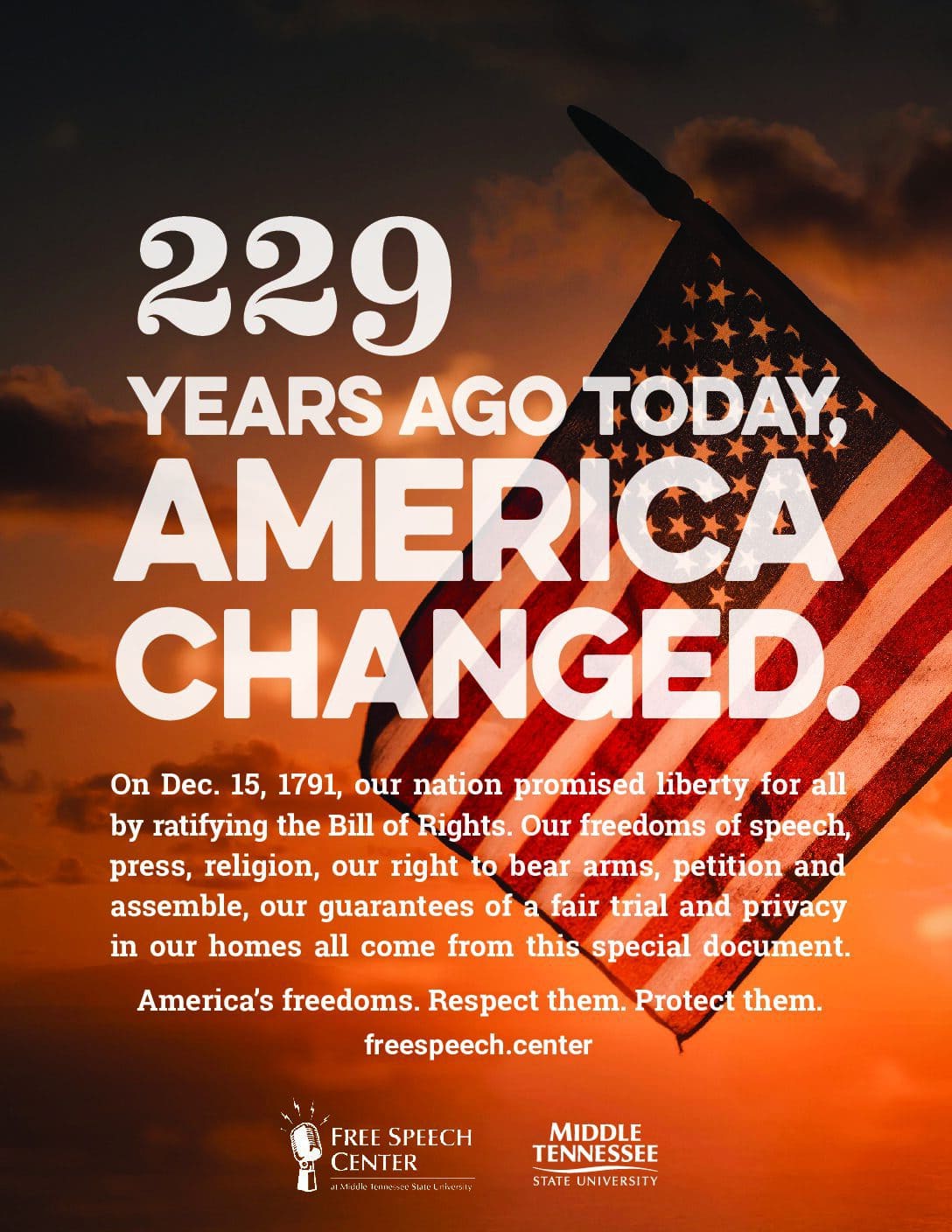1st Amendment of Constitution
“Congress shall make no law respecting an establishment of religion, or prohibiting the free exercise thereof; or abridging the freedom of speech, or of the press; or the right of the people peaceably to assemble, and to petition the Government for a redress of grievances.” – The First Amendment to the U.S. Constitution
The five freedoms it protects: speech, religion, press, assembly, and the right to petition the government.
Together, these five guaranteed freedoms make the people of the United States of America the freest in the world.
Before agreeing to accept the Constitution, the Founders of our democratic republic demanded that these freedoms be protected by an amendment to the original document – the First Amendment.
There’s no “legal age” you have to reach to exercise your First Amendment freedoms. They are guaranteed to you the day you’re born. There’s also no citizenship requirement for First Amendment protection. If you’re in the U.S., you have freedom of speech, religion, press, assembly and petition.
The First Amendment is neither “left-wing” or “right-wing.” It can be used to push for social and political change, or to oppose change. The First Amendment is for everyone.
The First Amendment protects us against government limits on our freedom of expression, but it doesn’t prevent a private employer from setting its own rules.
The First Amendment prevents government from requiring you to say something you don’t want to, or keeping you from hearing or reading the words of others (even if you never speak out yourself, you have the right to receive information).
Students have the right to pray in America’s public schools, as long as there’s no disruption to school operations and no government employees (teachers, coaches) are involved.
Looking for a general overview? Here it is:
The First Amendment was written because at America’s inception, citizens demanded a guarantee of their basic freedoms.
Our blueprint for personal freedom and the hallmark of an open society, the First Amendment protects freedom of speech, press, religion, assembly and petition.
Without the First Amendment, religious minorities could be persecuted, the government might well establish a national religion, protesters could be silenced, the press could not criticize government, and citizens could not mobilize for social change.
When the U.S. Constitution was signed on Sept. 17, 1787, it did not contain the essential freedoms now outlined in the Bill of Rights, because many of the Framers viewed their inclusion as unnecessary. However, after vigorous debate, the Bill of Rights was adopted. The first freedoms guaranteed in this historic document were articulated in the 45 words written by James Madison that we have come to know as the First Amendment.
The Bill of Rights — the first 10 amendments to the Constitution — went into effect on Dec. 15, 1791, when the state of Virginia ratified it, giving the bill the majority of ratifying states required to protect citizens from the power of the federal government.
The First Amendment ensures that “if there is any fixed star in our constitutional constellation, it is that no official, high or petty, can prescribe what shall be orthodox in politics, nationalism, religion, or force citizens to confess by word or act their faith therein,” as Justice Robert Jackson wrote in the 1943 case West Virginia v. Barnette.
It’s Your Right to Know Freedom of the Press
And as Justice William Brennan wrote in New York Times Co. v. Sullivan in 1964, the First Amendment provides that “debate on public issues … [should be] … uninhibited, robust, and wide-open.”
However, Americans vigorously dispute the application of the First Amendment.
Most people believe in the right to free speech, but debate whether it should cover flag-burning, hard-core rap and heavy-metal lyrics, tobacco advertising, hate speech, pornography, nude dancing, solicitation and various forms of symbolic speech. Many would agree to limiting some forms of free expression, as seen in the First Amendment Center’s State of the First Amendment survey reports.
Most people, at some level, recognize the necessity of religious liberty and toleration, but some balk when a religious tenet of a minority religion conflicts with a generally applicable law or with their own religious faith. Many Americans see the need to separate the state from the church to some extent, but decry the banning of school-sponsored prayer from public schools and the removal of the Ten Commandments from public buildings.
Further, courts wrestle daily with First Amendment controversies and constitutional clashes, as evidenced by the free-press vs. fair-trial debate and the dilemma of First Amendment liberty principles vs. the equality values of the 14th Amendment.
Such difficulties are the price of freedom of speech and religion in a tolerant, open society.
Source: The Freedom Forum Institute’s First Amendment Center















